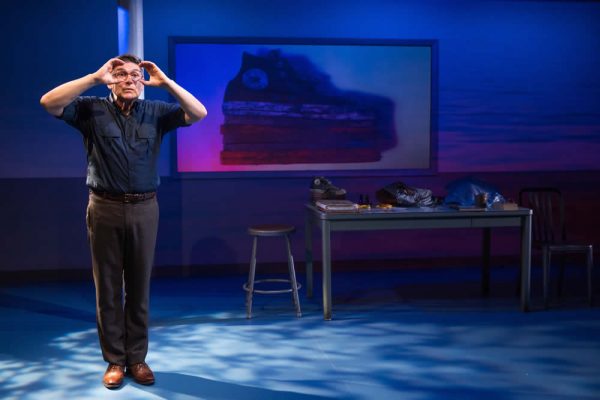He wore bright colored capri pants, telling all that capri stands for “capricious” rather than the Italian isle. He extolled the usefulness of little black dresses to women and was described as a gifted and imaginary actor with “jazz hands.”
Leonard, the lead character in “The Absolute Brightness of Leonard Pelkey,” also expressed an idiosyncratic fashion sense by gluing layers of rainbow colored flip-flops onto the soles of black Converse athletic shoes, turning them into platform booties.
He was 14 and, given the stuffy Jersey Shore where he lived, a loner.
And, one day he went missing.

The one-act, one-man play written and performed by James Lecesne and in performance this month at Laguna Playhouse is based on his young adult novel “Absolute Brightness.”
As a one-man performer, Lecesne is brilliant and completely believable, affecting variants of a New Jersey accent while impersonating a cop, a beauty parlor patron or a teen-age girl.
Working against an elegantly spare stage set designed by Jo Winarski, he keeps his audience on edge for roughly 80 minutes with nary a pause for breath. He nimbly pivots between Chuck DeSantis, a Shakespeare quoting, old-school detective; Ellen Hertle, the self-described aunt Leonard lived with; her introverted teen daughter, Phoebe; and the effete British owner of a local drama school.
He also becomes Gloria Salzano, a mobster’s widow who finds one of Leonard’s signature platforms floating on the lake. Adept at fishing, she also distinguishes a variety of knots, a crucial skill, it turns out.
Humor emerges when she lectures DeSantis on the real persona of a mobster’s wife, grills him on matters of faith and so gives the audience insight into the rough-edged cop who ultimately becomes as moved by Leonard as the people he queries.
The story begins when Ellen comes to the police station reporting Leonard missing for 24 hours, actually 19 hours and 47 minutes, and wants DeSantis to do something immediately.
Through his investigation, including interviews with the aforementioned characters, we find out who Leonard is or was. The missing youth meanwhile remains wordless, a shadow on a screen or represented by symbols such as a set of fairy wings.
Lecesne lets everyone describe Leonard, sometimes humorously, sometimes baffling, but always with affection and respect.
It’s noteworthy that all descriptions of Leonard, save for those by Phoebe, come from adults who marvel at his persona while also cautioning against excessive flamboyance. “Tone it down, honey,” says Marion, the salon patron, but Leonard counters that if he stopped being himself, the terrorists would win. And, he does not own a cellphone but carries a pocket watch.
Affected by Leonard’s vibe as well, DeSantis nonetheless dryly describes the video-game addled bullies who lure him into a wooded area and ultimately kill him.
He also has scant words for the lawyers who defend the louts who claim “gay panic,” meaning that Leonard may have made a pass at one of them.
Disaffected, alienated and bullied teens, some gay, some not, have driven a plethora of story lines, with the latest being “Dear Evan Hansen.” The musical revolves around a teenager with social anxiety and a schoolmate’s suicide. Written and composed by Benj Pasek and Justin Paul, the production premiered in 2015 and received six Tony Awards this past Sunday, June 11. One reviewer called the story’s moral ambiguity a sign of the current zeitgeist.
There is no such ambiguity in “Brightness.” Leonard is a good-natured, gifted kid who only transgressed by being himself. How everyone whose life he touched came to appreciate this and change their own entrenched ways will not be revealed here.
In 1994, Lecesne had created Trevor as part of the award winning show “Word of Mouth,” which he later adapted into a screenplay for a short film. After winning an Oscar for best live action short film, Trevor grew into a national movement initiated by Lecesne and the film’s producers Randy Stone and Peggy Rajski.
The project is a lifeline for lesbian, gay, bisexual, transgender and questioning youths in crises between age 13 and 24. The Trevor Life Line at 1-866-488-7386 is available daily. TrevorSpace connects LGBTQ youths world wide.




